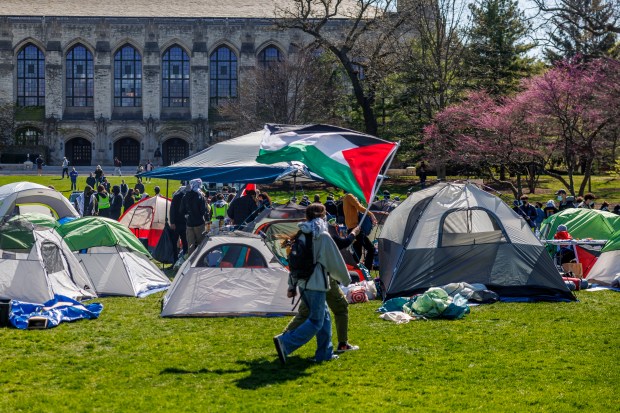Northwestern University on Monday reported an 88% drop in reports of antisemitic conduct over the last year in a report that outlined several steps the university has taken to secure its campus for Jewish students, faculty and staff.
The “progress report” follows months of scrutiny for the institution over its handling of alleged antisemitic conduct and mounting probes by the federal government. It comes weeks after Northwestern found itself among 60 schools to get a warning from President Donald Trump’s administration that they would lose funding if they didn’t boost protections for Jewish students on their campuses. The school last year was hit with a lawsuit from students over how it handled activists camped out on the university’s main green, known as Deering Meadow, to protest Israel’s war in Gaza. University officials said in response to federal warnings that they would “continue to work tirelessly” to make the institution “safe and non-discriminatory.”
In Monday’s report, the school made the case that it’s making good on those pledges.
“Virtually every indication is that the vast majority of our Jewish students, staff and faculty feel that the campus is much safer this year than it was last year,” the report stated.
The school was believed to be the first institution in the country to strike a deal with its encampment protesters, pledging to fund Palestinian scholars and renovate a building that can be used as a gathering space for Middle Eastern, North African and Muslim students among other commitments in exchange for getting the tents off the green. Northwestern President Michael Schill reiterated his commitment to make Jewish students feel comfortable and work with pro-Palestinian student protesters in a May 2024 Congressional hearing on antisemitism shortly after the school’s encampment wound down.
Federal officials have since questioned Schill’s testimony.
The university is now under investigation by the Department of Education and on a U.S. Department of Justice list of 10 institutions accused of not protecting their Jewish students and faculty, part of the Trump administration’s crackdown on alleged antisemitic action on campuses across the country.
One of the other schools on the Department of Justice list, Columbia University, lost $400 million in federal funding and made a number of changes to its protest policies, security and its Middle Eastern studies department, according to the New York Times. A man who helped lead Columbia’s encampment protest while a graduate student there was arrested by immigration authorities March 8, despite having legal permanent resident status.
Northwestern representatives said they were “fully cooperating” with federal probes into the university’s climate for Jewish students, faculty and staff. In its message Monday, the school said it had closed 15 cases related to student activism more generally, including violations of recently revised policies on demonstrations, prohibitions around face coverings and “unauthorized 3D installations including tents and structures.” Those policy changes took effect at the beginning of this academic year, the statement said.
The university has also established an advisory council to the president focused on Jewish life, introduced a mandatory 17-minute antisemitism training module produced in collaboration with the Jewish United Fund at the beginning of the academic year and has adopted an official definition of antisemitism from the International Holocaust Remembrance Alliance.
That definition, which is referenced in an executive order Trump issued during his first term in office, states that “antisemitism is a certain perception of Jews, which may be expressed as hatred toward Jews. Rhetorical and physical manifestations of antisemitism are directed toward Jewish or non-Jewish individuals and/or their property, toward Jewish community institutions and religious facilities.”
The university said it has also hired additional private security and police “empowered by the state to arrest people who trespass or otherwise violate the law.” A university spokesperson didn’t immediately respond to follow-up questions about what type of law enforcement the school had hired.
Students taking the yearly campus climate survey will also see new questions gauging “the experiences of Jewish students on campus and those of students of other religions.” The university promised to make the results of those evaluations public this spring and summer.




